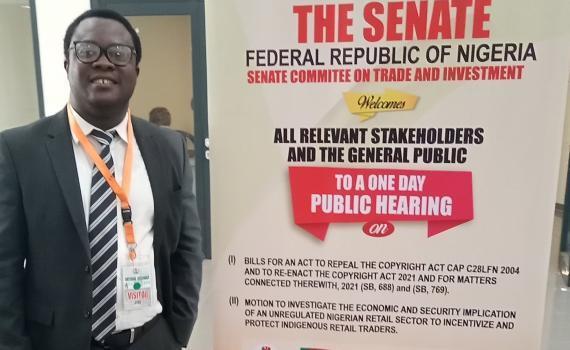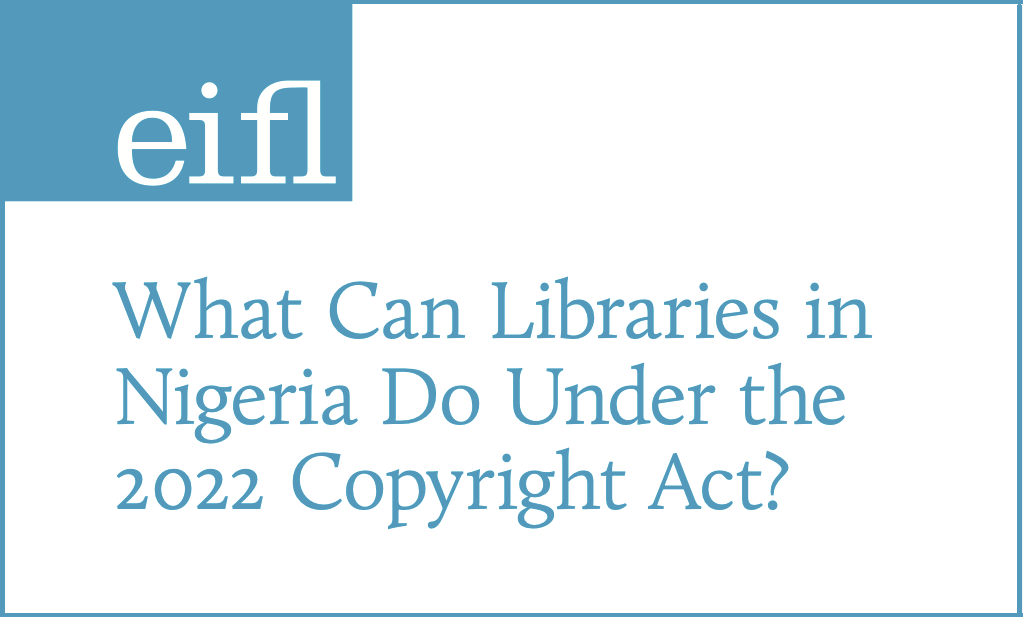
EIFL was engaged in copyright work in Nigeria from 2005 to 2024.
We provided training and built capacity among librarians in copyright and advocacy, and we provided input into the legislative process that led to the replacement of the 2004 Copyright Act with a new copyright law. The Copyright Act, 2022 (adopted in 2023), is one of the best in the world with respect to libraries - it contains a good range of exceptions that support libraries in the effective delivery of information services to students and scholars, online research and education, preservation of Nigerian cultural heritage and the building of accessible collections for persons with print disabilities.
The Copyright Act, 2022 also implements the Marrakesh Treaty for persons with print disabilities (Nigeria ratified the treaty in 2017).
In 2023, we published a guide to the new law and we evaluated its provisions against EIFL’s Core Library Exceptions Checklist (it scores a near perfect 34 out of 36 points). Key elements of the law, that draw on EIFL’s Draft Law on Copyright, include new exceptions permitting libraries and other cultural heritage institutions to make and distribute copies for preservation and other ordinary activities, and to make use of orphan and out-of-commerce works. There is also an expanded fair dealing provision that is open and flexible, and a provision that protects the exceptions from override by terms in licences. In 2024, we rounded off our engagement in the process by organizing a webinar with the Nigerian Copyright Commission to showcase the new law, endorsed by copyright experts as one of the most progressive in the world with respect to libraries and library activities, and an excellent example for other countries in Africa.
Between 2021-2023, our work in Nigeria was generously supported by the project ‘Contributing to Public Interest Copyright Policy at WIPO Promoting Access to Knowledge and the Right to Research'.
TIMELINE
2005 – 2024
MAIN ACTIVITIES AND ACHIEVEMENTS
Built capacity of library leadership in copyright issues and advocacy
- Between 2005-2010, EIFL’s Copyright Coordinator in Nigeria attended four EIFL training events: Regional Copyright Training, Uganda (2005); EIFL Copyright and Libraries Global Conference, Istanbul (2008 & 2009); Advanced Training in Copyright, Advocacy and Presentation Skills, UK (2010).
- In 2009, we supported EIFL’s Copyright Coordinator with a public presentation on the topic, “The importance of Protecting and Promoting Balanced Copyright for the Advancement of Nigeria’s Education System”, at an event organized by the Reproduction Rights Society of Nigeria (REPRONIG).
Supported copyright law reform
- In 2008, we supported participation of a UK-based library copyright expert at a panel discussion with the Nigerian Copyright Commission (NCC) on the topic copyright and digitisation projects (at the 2008 annual conference of the Nigerian Library Association). As a result, the library community was invited by the NCC to take part in future copyright law consultations (a Reform of the Copyright System was formally launched by NCC in 2012).
- In 2016, we commented on the Draft Copyright Bill, 2015 that included new special provisions for archives, libraries, museums and galleries, and for people with print disabilities (some provisions drew on EIFL’s Draft Law on Copyright). We supported the objectives of the bill to undertake a holistic review of the policy and legal framework, and to update Nigeria’s copyright law for the emergence of digital technologies.
- In 2021, we commented on the Copyright Bill, 2021 (Executive Bill). Overall the bill successfully addressed its objective to protect the rights of authors, and to provide for appropriate limitations and exceptions to ensure access to creative works. We highlighted how the COVID-19 pandemic increased the importance of legal access to online resources (countries with clear exceptions enabling the use of digital technologies for copyright-protected content were in general better equipped to support libraries, education and learning during COVID-19 lockdowns).

- In 2021, at a public hearing on the Copyright Bill, 2021 (Executive Bill) held at the Nigerian Senate, we supported a local legal academic to present EIFL’s comments on the bill. Dr Desmond Oriakhogba, Barrister and Solicitor of the Supreme Court of Nigeria and a Senior Lecturer, University of the Western Cape, South Africa presented our comments supporting the exceptions in the bill that were balanced, open and flexible. The bill was adopted by the Senate in April 2022. Read an account of the public hearing published in the law blog, IPKat.
- In January 2023, EIFL wrote to the President of Nigeria, His Excellency Muhammadu Buhari urging him to sign the Copyright Bill, 2022 into law at the earliest opportunity (the final legislative stage had been passed in July 2022 when the bill was adopted by the National Assembly). On 17 March 2023, the President signed the Copyright Bill, 2022 into law.
- In October 2023, we published a new EIFL guide, “What Can Libraries in Nigeria Do Under the 2022 Copyright Act?”. The guide summarizes the key provisions of the new law, provides a legal analysis of the elements related to libraries and library activities, and evaluates the law against the EIFL Core Library Exceptions Checklist (that sets out provisions that every copyright law should have to support modern library services and activities), scoring a near perfect 34 points (out of a possible 36). The law also implements the Marrakesh Treaty for persons with print disabilities, allowing libraries in Nigeria to make and distribute accessible format copies, including across borders. In addition, the new law is clear and well drafted, assisting libraries and other user communities in understanding what the new law means for them.
- In 2024, we organized a webinar with the Nigerian Copyright Commission and international copyright experts to showcase the Copyright Act, 2022. The speakers presented the key features of the new law, described the main provisions for libraries, and reflected on its significance for Africa and the rest of the world (it is one of the best in the world with respect to libraries and library activities, it can serve as a model for other countries in Africa that are reforming their copyright laws, and a reference point for implementation of the African Continental Free Trade Area (AfCFTA) Protocol on Intellectual Property (IP) Rights). There was strong global interest in the law that can also support discussions on limitations and exceptions at WIPO’s Standing Committee on Copyright and Related Rights (over 275 people from 30 countries, including 10 countries in Africa, registered for the webinar).





